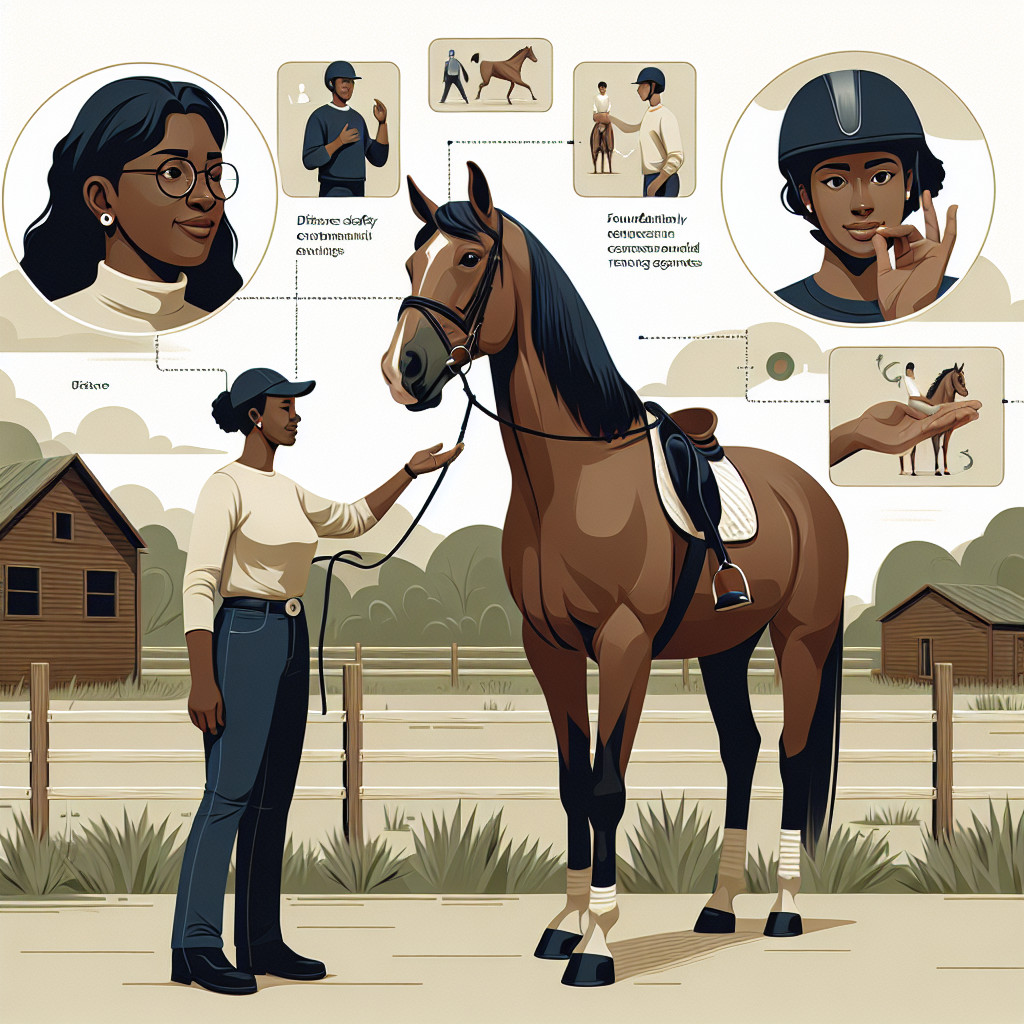Introduction: The Importance of Groundwork in Horse Training
Groundwork is a vital component of horse training as it establishes a strong foundation for a trusting and respectful relationship between the horse and the handler. By incorporating various exercises, groundwork helps improve the horse’s responsiveness and communication skills, making handling and riding safer and more enjoyable. This foundational training enhances safety by educating both the horse and the handler in understanding body language and establishing boundaries, thus minimizing the risks associated with unpredictable behavior. For further details, check out the [ultimate guide to groundwork for horses](https://groundworkforhorses.com/ultimate-guide-to-groundwork-for-horses/).
Understanding Horse Behavior: The Key to Effective Groundwork
Understanding horse behavior is crucial for effective groundwork and developing a respectful and trusting relationship with your horse. Spookiness, anxiety, and respect issues are common challenges faced by horse owners. Horses often exhibit these behaviors due to their prey instincts, leading to unpredictable reactions such as bolting or shying. Groundwork exercises, such as desensitization and pressure-release techniques, can help horses build confidence and reduce anxiety. Observing a horse’s body language helps handlers discern their psychological state, creating an environment where the horse feels safe and secure. A closer look at how animals exhibit similar behavioral challenges can be found on [Newsweek](https://www.newsweek.com/more-99-percent-dogs-have-behavior-problems-united-states).
Essential Groundwork Exercises for Beginners
Leading a horse through a series of foundational groundwork exercises aids in establishing respect and communication. Essential exercises include leading practice, backing up, yielding, desensitization, and circle work. Leading practice involves teaching the horse to walk beside you properly, enhancing respect. Yielding exercises teach the horse to move its hindquarters and forequarters away from slight pressure, fostering mutual respect. Desensitization introduces horses to a variety of stimuli to reduce spookiness. Circle work, or lunging, helps improve focus and obedience. Reliable practice with these techniques strengthens the horse-handler relationship, potentially leading to a rewarding riding experience. Visit this [groundwork exercises resource](https://groundworkforhorses.com/ground-exercises-to-do-with-your-horse/) for step-by-step guides.
Addressing Common Behavioral Challenges through Groundwork
Addressing dominance and respect issues through groundwork requires consistent communication and boundary setting. Exercises reinforcing respect for personal space include basic leading exercises where the horse should walk alongside without crowding. Desensitization using unfamiliar objects helps horses build confidence and reduce anxiety. Motivational issues, often perceived as laziness, improve with mentally stimulating exercises offering rewards. Managing disrespectful behaviors like nipping involves consistent correction using “pressure and release” techniques. These methods, rooted in understanding horse psychology, foster mutual respect and trust, aiding in equestrian partnerships. More about managing these behaviors can be found on [Yahoo Sports](https://sports.yahoo.com/article/since-ve-had-horses-feel-161700809.html).
Developing Physical Strength and Conditioning with Groundwork
Groundwork is essential for developing physical strength and conditioning in horses. Exercises like long lining, pole work, and lateral movements effectively engage different muscle groups. These exercises are crucial for improving muscle development, balance, and flexibility. For older horses or those in recovery, gentle groundwork aids rehabilitation. Controlled exercises maintain muscle mass, promoting health and preventing injuries. Groundwork supports not only physical but also mental well-being, strengthening the horse-handler bond. Explore gentle exercises tailored for your training needs at [Men’s Health](https://www.menshealth.com/uk/building-muscle/train-smarter/a64419816/over-50s-training-plan/).
Building a Positive Relationship through Groundwork
Groundwork lays the foundation for building a positive relationship using techniques like pressure/release and reward-based training. Pressure/release involves applying gentle pressure and releasing when the horse responds correctly, teaching control over the pressure. Reward-based training enhances trust with positive reinforcement for correct actions. Celebrating small successes encourages patience and consistency, strengthening the handler’s confidence. Beginner handlers should emphasize clear communication and gradually increase task complexity, maintaining safety. For insights on training strategies, read more on [Practical Horseman](https://practicalhorsemanmag.com/training/getting-started-groundwork-29902).
Safety First: Best Practices for Groundwork
Groundwork safety begins with ensuring both the horse and handler are in a distraction-free, controlled environment. Handlers must remain alert and aware, focusing on surroundings to prevent accidents. Consistent communication through clear body language and commands fosters mutual respect. Exercises encouraging positive reinforcement build confidence in both horse and handler, improving response to guidance. Address dominant or disrespectful behaviors immediately with gentle correction to maintain respect and safety. Building respect fundamentally ensures both groundwork and riding activities prioritize safety and well-being. For more safety strategies, check the [Guardian’s insights](https://www.theguardian.com/us-news/2025/apr/10/trump-budget-bill-republicans-house).
Conclusion: The Journey of Groundwork and Its Lifelong Benefits
Groundwork serves as a cornerstone in horse training, enhancing mutual respect and understanding between horses and handlers. By focusing on safety and patience, groundwork steadily builds trust, improving handling and riding experiences. These exercises instill responsiveness and respect in horses, addressing issues like crowding or leading difficulties. As handlers and horses work together, groundwork refines skills and conditioning, promoting both physical development and a deeper, lasting bond. Prioritizing groundwork ensures a positive and respectful partnership, offering lifelong benefits.
Frequently Asked Questions (F.A.Q.)
**What is groundwork in horse training?**
Groundwork involves exercises that establish trust and respect between horses and handlers, improving handling and riding experiences. It includes practices like leading, yielding, and desensitization.
**Why is understanding horse behavior important for groundwork?**
Understanding horse behavior enables handlers to effectively address anxiety, dominance, and respect issues, leading to a safer and more enjoyable experience.
**How can groundwork improve a horse’s physical condition?**
Exercises like long lining and pole work engage various muscle groups, improving muscle tone, coordination, and flexibility.
**What is the purpose of desensitization in groundwork?**
Desensitization reduces spookiness and anxiety by gradually introducing horses to different stimuli, promoting confidence and calmness.
**Why is consistency important in groundwork exercises?**
Consistency establishes reliable communication and trust, making horses more responsive and compliant in training sessions.
Learn more about groundwork methods and exercises at [Groundwork for Horses](https://groundworkforhorses.com/groundwork-exercises-for-horses/).
Sources
- Ars Technica – Researchers concerned to find AI models hiding their true reasoning processes
- BBC – How to understand your horse’s behavior
- Groundwork for Horses – Ultimate Guide to Groundwork for Horses
- Horse & Rider – Groundwork Lessons Every Horse Should Know
- Horse Illustrated – How to Do Groundwork
- The Horse – Training Your Horse: The Art of Patience
- Los Angeles Times – Sound bath: Equine therapy ranch offers healing through horses
- Men’s Health – Strength Training for Over-50s
- Market Brief – Ed-Tech Struggles and Breakthroughs
- Newsweek – Behavioral Problems in Domesticated Animals
- Neuroscience News – Fatigue and Motivation: New Insights
- Practical Horseman – Getting Started with Groundwork
- Yahoo Sports – Developing Respect in Horses

